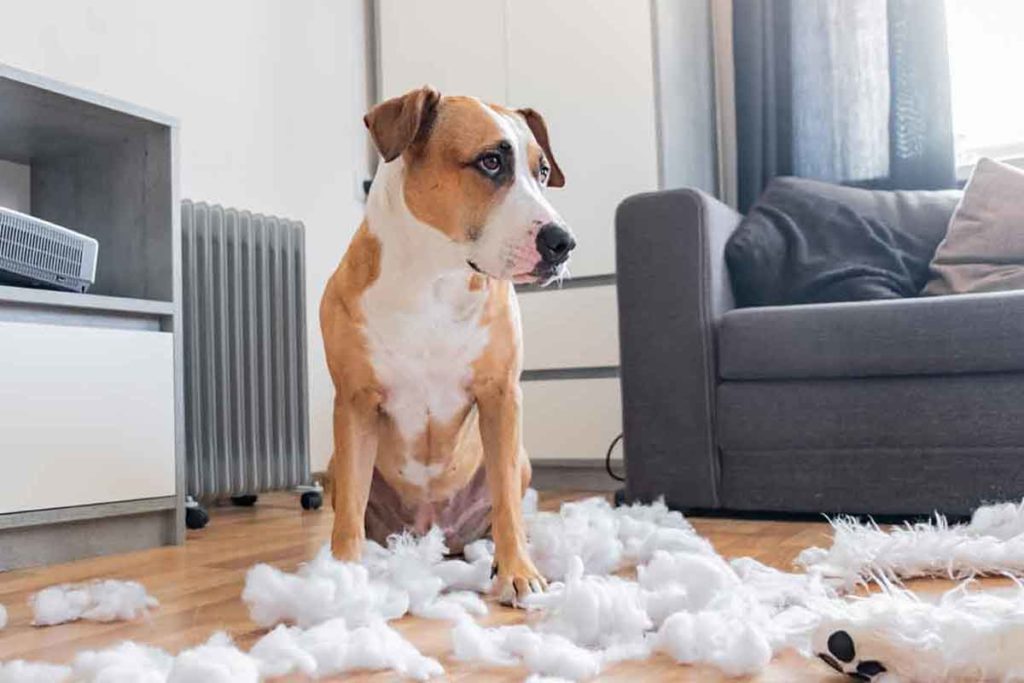Sure, we take our dogs on all kinds of adventures and take them on their daily walks. But generally, most days look just the same as every other day for our canine companions. Don’t they get bored? The answer is yes. Parents of dogs suffering from boredom have likely come home to toilet paper strewn across the house or a shoe chewed to shreds.
Most dogs were originally bred to perform certain jobs, even if that was simply being a companion pup. Their lives usually look much different now, getting everything they want and need for free without lifting a finger. They’re also spending more time alone while we’re out in the world running errands or at the office. Without stimulation, dogs are likely to make their own fun, often in ways that we don’t like. So, how can pet parents prevent dog boredom and the trouble that comes with it?
Table of contents
- Bad behavior: Signs of boredom
- Is it boredom or stress?
- How can ElleVet’s CBD + CBDA help my stressed dog?
- Preventing dog boredom
- Bottom line
Bad behavior: Signs of boredom
When your pup becomes bored from not getting enough exercise, mental stimulation, or interaction they can become frustrated. They may act out in inappropriate and even destructive ways. According to the American Kennel Club (AKC), a significant amount of bad behavior is an expression of boredom. What’s entertaining for them is often destructive to your home. Your dog can also cause accidental harm to themselves, so keeping boredom to a minimum is in everyone’s best interest.
Every dog is different. AKC notes that dogs experiencing boredom may sleep more than usual or show diminished enthusiasm for toys or food. Others may chew anything and everything in sight. You may notice your dog has shredded pillows, unrolled toilet paper, tipped over the trash, counter surfed, or dug a huge hole in the backyard. Whatever they can find to pass the time, particularly if there’s no supervision.
Big messes greeting you when you get home is a clear sign that your dog has nothing to do. But dog boredom can strike even when you are home. Your furry friend may constantly pester you for attention, jump on you, act restless, or bark excessively. These are all bothersome in their own way.
Is it boredom or stress?
First things first, it’s important to rule out the potential for your dog to be acting out due to stress. Signs that your dog is stressed, such as destructive or clingy behavior, can easily be confused with behaviors characteristic of boredom. With this, doggy stress often goes unaddressed, which is unhealthy and unfair for your pup.
American Humane notes that boredom in dogs usually takes about an hour to set in. Coming home to a destroyed house after only leaving for a few minutes could be a sign that something more is going on. Your pup may be experiencing separation-related or generalized stress. Consult your veterinarian, and perhaps a dog trainer and or animal behaviorist, if you suspect your dog is more than just bored.
How can ElleVet’s CBD + CBDA help my stressed dog?

If there’s one thing doctors and veterinarians will agree on, it’s that stress in any form is not good for the short- and long-term health of you and your pup. ElleVet’s CBD + CBDA chews, soft gels, and oils can help put your dog’s mind at ease, calming them before they turn to destructive and harmful behaviors. In addressing your dog’s short-term and or long-term stress, ElleVet’s CBD + CBDA can lead to improved overall well-being. And we all want a happy, relaxed pup!
As always, consult your veterinarian about any mental or physical health issues your dog may be experiencing. For any questions about ElleVet’s CBD + CBDA products or how CBD can help your canine friend live their best life, give us a call (844-673-7287) or send us an email ([email protected]). We are here to help.
Preventing dog boredom
Fortunately, there are a few things dog owners do to help prevent their dog’s boredom:
Exercise
A tired dog is a well-behaved dog. With the appropriate amount of physical activity, your pup is more likely to nap than get into trouble or beg for attention. Just like giving your dog healthy food and a safe place to sleep, owners should prioritize getting their pup enough exercise. Some breeds naturally require more than others, and exercising your dog should include both physical and mental stimulation. Try to keep things interesting by incorporating a variety of activities—fetch, walks, games, training, etc.
Mental stimulation
Giving your dog’s brain a workout is just as important as exercising their body, and can be just as exhausting. Interactive games like tug of war and hide and seek are fun ways to both engage your pup mentally and bond with them at the same time. You can also try puzzle toys and snuffle mats than dispense treats, or even make them work for their meal. Stuffing toys like Kongs with treats and even hiding these toys around the house while you’re away is a great way to keep your pup busy. This will not only work their minds, but will also take a long time, so your pup is likely to tire themself out.
Chewing is a great mental exercise for dogs, which is why so many turn to destructive chewing when bored. To avoid damage to your home and precious belongings, make sure your pup knows what they’re allowed and not allowed to chew. When you catch your pup chewing on something bad, interrupt them as soon as possible. Redirect their attention to a “safe” chew toy that they enjoy and reward and or praise them. This will reinforce the wonderful activity of chewing, but only with appropriate toys rather than your slippers.

Training
Obedience, agility, and trick training are all effective tools for providing your dog with both physical and mental exercise. Similar to taking your pup out for a walk and playing tug of war with them before you have to leave them alone, try a quick training session. Teaching your furry friend how to roll over will tucker them out while letting you bond.
Socialization
Socializing can be both mentally and physically exhausting if there is running and playing involved. Animal behaviorist Dr. Erica Feuerbacher points out that dogs are pack animals and need socialization to support their emotional well-being. So, get out there for some doggy playdates and trips to the dog park! Be mindful, however, about finding your dog a good match for playtime. For example, an outgoing dog who likes to chase and wrestle would not play well with a shy pooch.
Boredom tends to be less of an issue in households with more than one dog. A built-in playmate! This line of thinking often leads pet parents to “get a dog for their dog.” Bringing home another dog is not something that pet parents take lightly. There are several factors that should be seriously considered, including each dogs’ temperaments and your ability to take care of an additional animal.
Give a dog a job
Many breeds have working backgrounds, which pet parents can utilize to their advantage when it comes to staving off their dog’s boredom. While puzzles and treat dispensing toys are great options for keeping your pup occupied, giving your dog a job goes a little further. Owners of terriers, for example, may find their pup digging up the backyard. Offering an appropriate place to work this digging instinct can help with boredom. You can try getting a sandbox and hiding toys for your digger dog to find.
Home entertainment
Perhaps your dog thrives on being around people and the chaos of a busy house. Fear Free Happy Homes recommends leaving the television on for dogs who enjoy watching or simply having the sound on in the background. They may like the evening news, a sports game, or a nature show. You can also easily find videos on YouTube produced specifically for dogs. There are even entire cable networks devoted to our canine companions!
Consider getting help
For some pet parents, there is the option of getting friends, family, or hired professionals to help keep their dog busy throughout the day. Owners may leave their pup at doggy daycare every day or hire a dog walker to come to their house while they’re away. This does cost money and isn’t always available to everyone. Owning a dog is a serious responsibility and prioritizing your pup’s mental and physical health is crucial. Dogs should not be left alone, particularly in a crate, for long periods of time. If restricting your dog’s access to the rest of the house by keeping them in a crate all day appears to be the only way to prevent problem behavior, consider getting additional support.
Bottom line
It is important to highlight that problem behaviors that are practiced repeatedly quickly become ingrained and can be difficult to stop. This is true for destructive behaviors that your pup may turn to when they are bored. Therefore, it is important to give your pooch ample opportunity to get out their energy in positive ways. And make sure they know which behaviors and acceptable and which are not.
If you’re noticing that your dog appears to be acting out due to boredom, make sure these bad behaviors aren’t signs of stress. Making sure your pup’s basic needs for physical exercise, mental stimulation, and socialization are met will go a long way towards keeping them happy and busy—and not eating your shoes.








